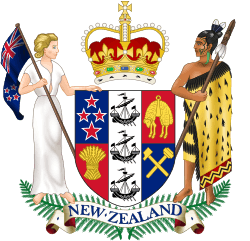Misuse of Drugs Act 1975
The Misuse of Drugs Act 1975 is a New Zealand drug control law that classifies drugs into three classes, or schedules, based on their projected risk of serious harm.[1] In December 2018 it was amended to permit terminally ill patients to use marijuana without risk of prosecution.[2][3]
| Misuse of Drugs Act 1975 | |
|---|---|
 | |
| New Zealand Parliament | |
Long title
| |
| Status: Current legislation |
Legislative history
The Misuse of Drugs Act was passed by the New Zealand Parliament into law in 1975.[1]
On 11 December 2018, the Labour-led Coalition Government passed the Misuse of Drugs (Medicinal Cannabis) Amendment Act, which amended the existing law to permit terminally ill patients to use marijuana without risk of prosecution.[2][3]
On 18 December 2018, the Government announced that it would also hold a referendum on legalizing recreational cannabis during the 2020 general election.[4][5]
In March 2019, the Misuse of Drugs Amendment Bill was introduced.[6] This added AMB-FUBINACA and 5F-ADB as Class A drugs; but most comment was around the phrase "affirm the existing discretion to prosecute", with lawyers and others saying that this would effectively mean an end to prosecution for mere possession of any drug.[7][8] It was passed and became effective in August 2019.[9]
Legislative features
Class A
First Schedule: Very high risk of harm and illegal:
Class B
Second Schedule: Very high risk of harm and on prescription:
- Amphetamine
- Cannabis (hashish, cannabis oil, or other preparation)
- Ephedrine
- GHB
- Hydromorphone
- MDMA (ecstasy)
- Methadone
- Morphine
- Opium
- Oxycodone
- Pethidine
- Pseudoephedrine
Class C
Third Schedule: Moderate risk of harm:
- Barbiturates1 (phenobarbital, barbital, etc.)
- Benzodiazepines2 (diazepam, alprazolam, lorazepam, nitrazepam, etc.)
- Benzylpiperazine (BZP)
- Cannabis (plant, leaf, fruit or seeds)
- Codeine
^Note 1 : Pentobarbital, secobarbital and amobarbital are subject to more legal restrictions and tougher penalties than are other Class C substances.
^Note 2 : Temazepam and flunitrazepam are subject to more legal restrictions and tougher penalties than are other Class C substances.
Fourth Schedule
Precursor substances.
Conventions
The Expert Advisory Committee on Drugs (EACD) makes scheduling decisions, based on scientific and medical evidence and/or international treaty obligations. New Zealand is a party to the Single Convention on Narcotic Drugs, the Convention on Psychotropic Substances and the United Nations Convention Against Illicit Traffic in Narcotic Drugs and Psychotropic Substances.
National Drug Policy New Zealand notes, "The Conventions place certain obligations on signatory countries. When the UN classifies (or re-classifies) a substance under one of the above Conventions, it requires signatory countries to amend their domestic legislation to ensure consistency with the UN's amendment. Accordingly, the impetus for some of the drugs to be considered by the EACD will originate from decisions made at the UN".
See also
References
- "Misuse of Drugs Act 1975 No 116 (as at 01 December 2010), 3A Classification of drugs". New Zealand Legislation: Acts. Retrieved 16 June 2011.
- Bennett, Lucy (11 December 2018). "Medicinal cannabis bill passes third reading". New Zealand Herald. Retrieved 28 December 2018.
- Roy, Eleanor Ainge (11 December 2018). "New Zealand passes laws to make medical marijuana widely available". The Guardian. Retrieved 28 December 2018.
- Cooke, Henry (11 December 2018). "Cannabis referendum will be held at 2020 election, Government confirms". Stuff.co.nz. Retrieved 28 December 2018.
- "Binding referendum on legalising cannabis for personal use to be held at 2020 election". Radio New Zealand. 18 December 2018. Retrieved 28 December 2018.
- "Misuse of Drugs Amendment Bill". NZ Government. Retrieved 9 May 2019.
- Cheng, Derek (2 May 2019). "Watershed bill described as drug decriminalisation - despite Govt claims to the contrary". NZ Herald. Retrieved 9 May 2019.
- Devlin, Collette (1 May 2019). "Concerns police discretion under new health-based drug law could see de facto decriminalisation of all drugs". Stuff. Retrieved 9 May 2019.
- "Changes to the Misuse of Drugs Act". Ministry of Health. Retrieved 4 December 2019.
External links
- Misuse of Drugs Act 1975 - text of the Act
- Review of Misuse of Drugs Act 1975 at the New Zealand Law Commission